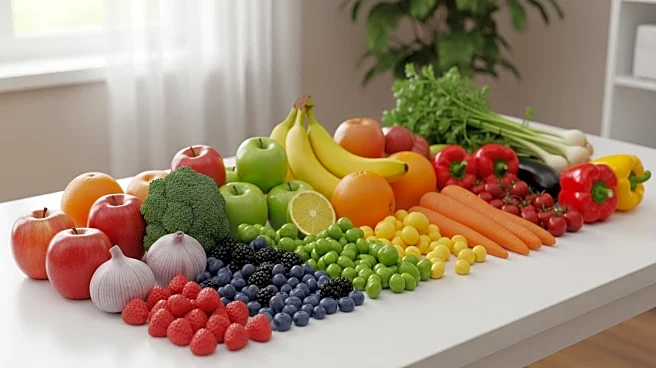What's Happening?
Walmart, the largest grocery retailer in the United States, has announced plans to eliminate synthetic dyes, preservatives, artificial sweeteners, and fat substitutes from its private-label food products by January 2027. This decision aligns with a broader industry trend towards cleaner food options, driven by consumer demand and regulatory pressure. Health and Human Services Secretary Robert F. Kennedy Jr. has been a vocal advocate for this change, likening these additives to 'poisonous compounds.' The move will affect Walmart's Great Value, Freshness Guaranteed, Bettergoods, and Marketside brands, which are popular among American households. The retailer has already made significant strides, with 90% of its private-label items free from synthetic dyes prior to this announcement.
Why It's Important?
The removal of synthetic dyes and additives from Walmart's private-label products is significant for several reasons. Firstly, it reflects a growing consumer preference for healthier and simpler ingredient lists, which could influence other major retailers and food manufacturers to follow suit. This shift could lead to a broader industry transformation, impacting how food products are formulated and marketed. Additionally, the move aligns with public health initiatives aimed at reducing chronic diseases and childhood illnesses linked to food additives. As Walmart is a major player in the grocery sector, its decision could have a ripple effect, encouraging other companies to prioritize consumer health and safety.
What's Next?
Walmart plans to roll out reformulated products over the coming months, with some items potentially appearing on shelves with altered or less-vivid colors due to the absence of synthetic dyes. The company is testing new formulations with customers to ensure acceptance and satisfaction. Other food manufacturers, such as Kraft Heinz and Hershey, have also committed to removing certain dyes from their products, indicating a broader industry shift. As regulatory pressures increase, more states may enact legislation similar to California's ban on Red No. 3, further accelerating the transition to natural ingredients.
Beyond the Headlines
The transition away from synthetic dyes and additives presents challenges, including sourcing natural alternatives like beetroot and turmeric, which may require adjustments in supply chains and production processes. These changes could affect product texture, taste, and consistency, posing logistical and financial challenges for manufacturers. However, the move towards natural ingredients also offers opportunities for innovation in food production and marketing, potentially leading to new product lines and consumer engagement strategies.









